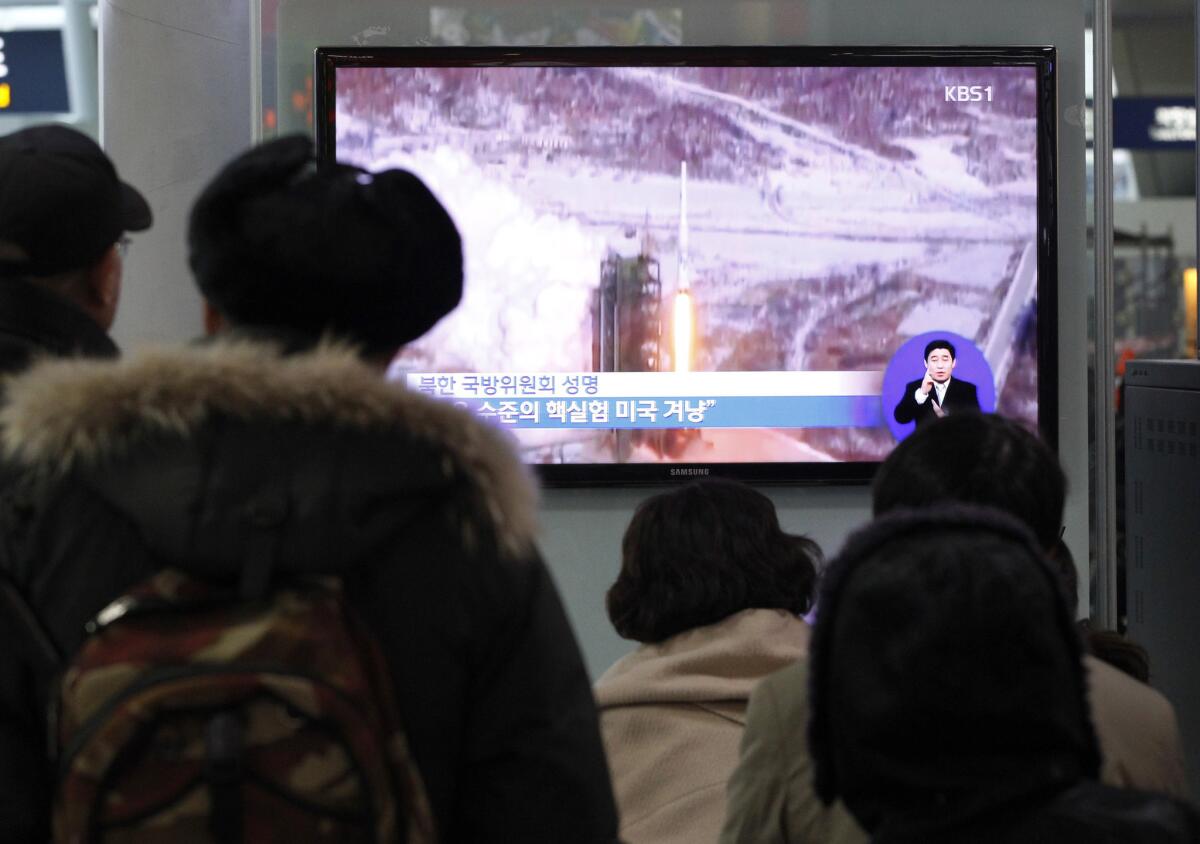China calls for talks after North Korean threat

BEIJING -- With North Korea openly threatening the United States with nuclear weapons, China called Thursday for a new round of diplomacy and appears to be growing increasingly frustrated with its longtime ally.
Beijing’s calls for intervention come amid a torrent of belligerent language from Pyongyang, angered by a United Nations resolution earlier in the week expanding sanctions over its missile and nuclear program.
The latest escalation came Thursday when Pyongyang lashed out at the United States, which it called the “archenemy of the Korean people.’’
RELATED: China’s me-first foreign policy
“We are not disguising the fact that the various satellites and long-range rockets that we will fire and the high-level nuclear test we will carry out are targeted at the United States,” North Korea’s National Defense Commission said in a statement released by the official news service.
“Settling accounts with the U.S. needs to be done with force, not with words,” it said.
[Updated 10:46 a.m. Jan. 24: In Washington, White House press secretary Jay Carney called North Korea’s statement “needlessly provocative,” adding that a test would be a “significant violation of United Nations Security Council resolutions.”
Carney said the recent Security Council resolution should send a “strong message of the international community’s opposition to North Korea’s provocations.”
“These tightened sanctions will help impede the growth of weapons-of-mass-destruction programs in ... North Korea,” he said. He added that the United States “will be taking additional steps in that regard,” but declined to say what those actions might be.
“We judge North Korea by its actions” he said, “and provocations like these are significant violations . . . We certainly haven’t seen a noticeable change in behavior.”]
PHOTOS: Crippling pollution in China
North Korea’s confrontational stand dampened hopes that the country might be following a more moderate course under its new 30-year-old leader, Kim Jong Un, who took over 13 months ago following the death of his father Kim Jong Il.
“We can see that the new leadership is appropriating the nuclear and missile tests as props underscoring regime legitimacy. That shows they are not ready to deal with the outside world in any constructive way,’” said Scott Snyder, a fellow with the Council on Foreign Relations and an expert in North Korean negotiating behavior.
Snyder said it was an “inevitability” that North Korea would follow through with threats to conduct a third nuclear test. South Korean intelligence believes that preparations are already in place.
“It is our understanding that if the leadership gives consent, the North can detonate a nuclear device whenever it wants to,” a South Korean Defense Ministry spokesman was quoted as saying Thursday.
It was in response to that threat from North Korea that the new head of the Chinese Communist Party, Xi Jinping, was quoted in major Chinese state newspapers Thursday recommending the resumption of six-nation talks that collapsed four years ago to address the North Korean nuclear program.
Impoverished but heavily armed North Korea already has conducted two nuclear tests, in 2006 and 2009. Last month it successfully launched a multistage missile, putting a satellite in orbit. The launch was considered in effect a test of the country’s intercontinental ballistic missile technology, though analysts believe North Korea is still many years away from a workable weapon that could reach the U.S., much less with a nuclear warhead.
Frustrated with its longtime ally, China took a surprising step against North Korea on Tuesday by voting in favor of the U.N. Security Council resolution condemning the rocket launch.
For years, Beijing has been encouraging North Korea to follow Chinese-style economic reforms, loosening the controls on its tightly controlled economy.
From 2003 to 2007, China led the six-nation talks -- which included the United States, Japan, South Korea and Russia as well as North Korea -- on the nuclear program. Analysts believe, however, it is unlikely that North Korea will return to negotiations, even under strong pressure from Beijing.
For the Chinese, Snyder said, calls for multiparty talks are seen more as a “crisis management mechanism, so they can rest easy there will not be any escalation.”
ALSO:
Trial in Indian gang-rape case begins
Final vote tally in Israel gives right slight edge
Egyptian human rights group says police abuses continue
More to Read
Sign up for Essential California
The most important California stories and recommendations in your inbox every morning.
You may occasionally receive promotional content from the Los Angeles Times.










